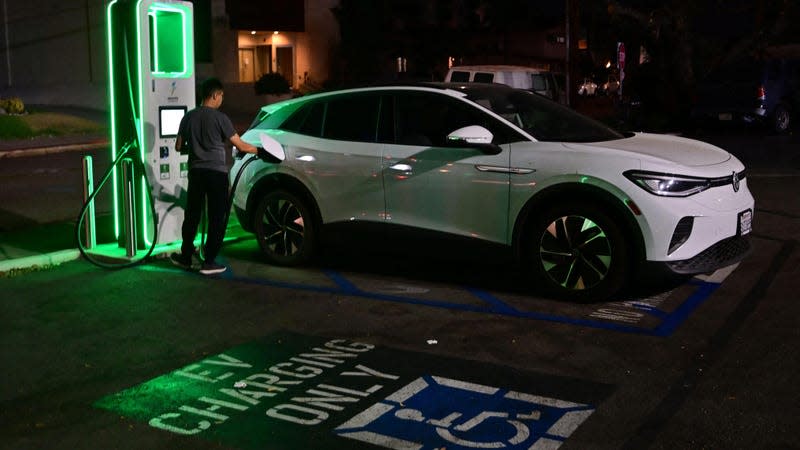Charging Stations Are Uniquely Vulnerable to Sabotage

Transitioning to electric vehicles is going to take some getting used to, and the biggest pain point is charging. It’s also an EV’s not-so-secret weak spot, but it’s not just the long charge time and frustrations over actually finding a charger. A new story from Heatmap details just how many ways chargers have been blocked, hacked or knocked offline by ill-wishers.
In case you missed it:
Formula 1's Race Strategy in America Isn’t Convincing Fans to Stick Around
The 2024 Chevrolet Trax Proves Cheap is Fun and Cheap is Good
The problem, Heatmap points out, is obvious: EV chargers are not overseen by a human being. They can exist in deserted parking lots, the roofs of parking garages or behind businesses where both charger and EV owner are more vulnerable to misuse and abuse:
Read more
During daylight hours, this setup means customers can charge while visiting stores at the mall or having a meal, but at night, these parking lots are deserted. A charging station does not need a human attendant, so the late-night EV traveler may find themselves alone. A midnight thief, meanwhile, might find the station unguarded. Last summer, Vice reports, bandits stole cords from chargers in Reno, Nevada, while cars were in the middle of charging. One happened at a hotel, another at a mall. In Los Angeles, a station saw all its wires cut on Earth Day last year.
Copper thieves, just like those who are stealing a rash of catalytic converters from gas and hybrid cars, have a clear economic motivation. But EVs are also vulnerable to attackers motivated by politics or spite. Tesla owners have used the car’s “Sentry Mode,” which records what the vehicle cameras are seeing, to catch a variety of vandals targeting the cars, some of whom seem driven by dislike of EVs or of Tesla and outspoken CEO Elon Musk. When a Florida couple saw their charging cable destroyed while their Chevy Bolt was plugged in at home — requiring them to buy a $450 replacement — they thought someone was trying to “send them a message.”
So far, vandalism incidents have been relatively rare. A spokesperson for Electrify America, for example, told me they account for less than 1 percent of the company’s charger repairs, and that it installed extra lighting and cameras in places with recurring issues. But that’s not the only concern. Charging stations are also linked to the internet in order to process payments and monitor their status, and anything that’s connected is inherently hackable. This January, someone had a laugh remotely hijacking the screens that control Electrify America chargers.

 Yahoo Autos
Yahoo Autos 